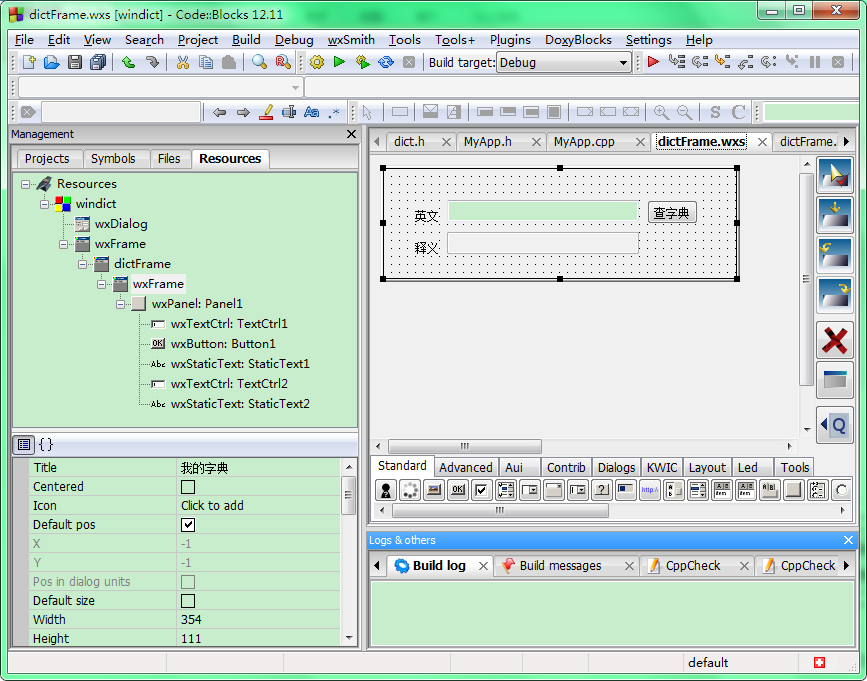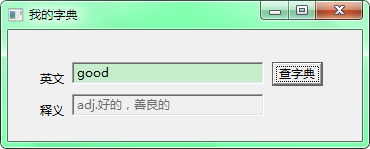课程首页在:http://blog.csdn.net/sxhelijian/article/details/11890759,内有完整教学方案及资源链接
【项目3-OOP版电子词典】(本程序需要的相关文件,请到https://pan.baidu.com/s/1b4CgkI下载。)
做一个简单的电子词典。在文件dictionary.txt中,保存的是英汉对照的一个词典,词汇量近8000个,英文、中文释义与词性间用’\t’隔开。
编程序,由用户输入英文词,显示词性和中文释义。
【项目3拓展1(选做)】使这个词典,读入一篇文章,输出对其中的所词的解释。例如,对aboutcpp.txt,输出如下左图结果所示(也可以看到其中待改进的地方)。
【项目3拓展2(选做)】试用wxwidgets做一个窗口版的电子词典,如下右图所示:
本文是拓展2的参考解答:
第一部分工作:编写业务逻辑
一个程序中,最基本的是其业务。先定义词(Word)类和字典(Dictionary)类如下:
dict.h
#ifndef DICT_H_INCLUDED
#define DICT_H_INCLUDED
using namespace std;
//定义词条类
class Word
{
public:
void set(string e, string c, string wc);
int compare(string); //英语部分与给定字符串比较,等于返回,大于返回,小于返回-1
string getChinese();
string getWord_class();
private:
string english;
string chinese;
string word_class;
};
//定义字典类
class Dictionary
{
public:
Dictionary();
string searchWord(string k);
private:
int BinSeareh(int low, int high, string k);
int wordsNum;
Word words[8000]; //用于保存词库
};
#endif // DICT_H_INCLUDED
dict.cpp
#include <fstream>
#include <cstdlib>
#include "dict.h"
using namespace std;
void Word::set(string e, string c, string wc)
{
english=e;
chinese=c;
word_class=wc;
}
int Word::compare(string k)
{
return english.compare(k);
}
string Word::getChinese()
{
return chinese;
}
string Word::getWord_class()
{
return word_class;
}
Dictionary::Dictionary()
{
string e,c,wc;
wordsNum=0;
//将文件中的数据读入到对象数组中
ifstream infile("dictionary.txt",ios::in); //以输入的方式打开文件
if(!infile) //测试是否成功打开
{
//cout<<"dictionary open error!"<<endl;
exit(1);
}
while (!infile.eof())
{
infile>>e>>c>>wc;
words[wordsNum].set(e, c, wc);
++wordsNum;
}
infile.close();
}
int Dictionary::BinSeareh(int low, int high, string key)
{
int mid;
while(low<=high)
{
mid=(low + high) / 2;
if(words[mid].compare(key)==0)
{
return mid; //查找成功返回
}
if(words[mid].compare(key)>0)
high=mid-1; //继续在w[low..mid-1]中查找
else
low=mid+1; //继续在w[mid+1..high]中查找
}
return -1; //当low>high时表示查找区间为空,查找失败
}
string Dictionary::searchWord(string key)
{
int low=0,high=wordsNum-1; //置当前查找区间上、下界的初值
int index=BinSeareh(low, high, key);
if(index>=0)
return words[index].getWord_class()+words[index].getChinese();
else
return "查无此词";
}
这部分工作可以先行进行测试。测试工作不需要窗口,建立console application来完成更靠谱。见链接 http://blog.csdn.net/sxhelijian/article/details/28230293和 http://blog.csdn.net/sxhelijian/article/details/28231661。
第二部分工作 用wxSmith制作界面
可以按wxWidgets教程(见http://blog.csdn.net/sxhelijian/article/details/26158709),通过代码制作界面,简单的办法是用wxSmith。作为专业学生,应该学会代码,以掌握类库工作的原理,但要快速开发,wxSmith也提倡使用。
在code::Blocks中,点菜单wxSmith-->Add wxFrame,制作好的界面如下。本文中,对应的资源文件名是dictFrame.wxs:
第三部分工作 为界面上的元素配备代码
在生成如上界面的同时,产生两个文件:dictFrame.h和dictFrame.cpp。.wxs文件资源文件的目标也就是生成这两个文件,这是应用程序中的代码部分。
下面列出的是这两个文件中的内容,大部分由框架提供,需要自加的部分,给出了注释。
dictFrame.h
#ifndef DICTFRAME_H
#define DICTFRAME_H
//(*Headers(dictFrame)
#include <wx/stattext.h>
#include <wx/textctrl.h>
#include <wx/panel.h>
#include <wx/button.h>
#include <wx/frame.h>
//*)
#include "dict.h" //自己加,要用到字典类
class dictFrame: public wxFrame
{
public:
dictFrame(wxWindow* parent,wxWindowID id=wxID_ANY,const wxPoint& pos=wxDefaultPosition,const wxSize& size=wxDefaultSize);
virtual ~dictFrame();
//(*Declarations(dictFrame)
wxStaticText* StaticText2;
wxButton* Button1;
wxPanel* Panel1;
wxStaticText* StaticText1;
wxTextCtrl* TextCtrl2;
wxTextCtrl* TextCtrl1;
//*)
protected:
//(*Identifiers(dictFrame)
static const long ID_TEXTCTRL1;
static const long ID_BUTTON1;
static const long ID_STATICTEXT1;
static const long ID_TEXTCTRL2;
static const long ID_STATICTEXT2;
static const long ID_PANEL1;
//*)
private:
Dictionary dict; //自己加:将字典类对象作为Frame类的成员
//(*Handlers(dictFrame)
void OnButton1Click(wxCommandEvent& event);
void OnClose(wxCloseEvent& event);
//*)
DECLARE_EVENT_TABLE()
};
#endif
dictFrame.cpp
#include "dictFrame.h"
#include "dict.h"
//(*InternalHeaders(dictFrame)
#include <wx/intl.h>
#include <wx/string.h>
//*)
//(*IdInit(dictFrame)
const long dictFrame::ID_TEXTCTRL1 = wxNewId();
const long dictFrame::ID_BUTTON1 = wxNewId();
const long dictFrame::ID_STATICTEXT1 = wxNewId();
const long dictFrame::ID_TEXTCTRL2 = wxNewId();
const long dictFrame::ID_STATICTEXT2 = wxNewId();
const long dictFrame::ID_PANEL1 = wxNewId();
//*)
BEGIN_EVENT_TABLE(dictFrame,wxFrame)
//(*EventTable(dictFrame)
//*)
END_EVENT_TABLE()
dictFrame::dictFrame(wxWindow* parent,wxWindowID id,const wxPoint& pos,const wxSize& size):dict() //加上对子对象dict的初始化,读入字典
{
//(*Initialize(dictFrame)
Create(parent, id, _("我的字典"), wxDefaultPosition, wxDefaultSize, wxDEFAULT_FRAME_STYLE, _T("id"));
SetClientSize(wxSize(354,111));
Move(wxDefaultPosition);
Panel1 = new wxPanel(this, ID_PANEL1, wxPoint(64,56), wxDefaultSize, wxTAB_TRAVERSAL, _T("ID_PANEL1"));
TextCtrl1 = new wxTextCtrl(Panel1, ID_TEXTCTRL1, wxEmptyString, wxPoint(64,32), wxSize(192,22), 0, wxDefaultValidator, _T("ID_TEXTCTRL1"));
Button1 = new wxButton(Panel1, ID_BUTTON1, _("查字典"), wxPoint(264,32), wxSize(51,24), 0, wxDefaultValidator, _T("ID_BUTTON1"));
StaticText1 = new wxStaticText(Panel1, ID_STATICTEXT1, _("释义"), wxPoint(32,72), wxDefaultSize, 0, _T("ID_STATICTEXT1"));
TextCtrl2 = new wxTextCtrl(Panel1, ID_TEXTCTRL2, wxEmptyString, wxPoint(64,64), wxSize(192,22), 0, wxDefaultValidator, _T("ID_TEXTCTRL2"));
TextCtrl2->Disable();
StaticText2 = new wxStaticText(Panel1, ID_STATICTEXT2, _("英文"), wxPoint(32,40), wxDefaultSize, 0, _T("ID_STATICTEXT2"));
Connect(ID_BUTTON1,wxEVT_COMMAND_BUTTON_CLICKED,(wxObjectEventFunction)&dictFrame::OnButton1Click);
//*)
TextCtrl1->SetFocus (); //自己加:希望输入英文的文本框获得“焦点”
}
dictFrame::~dictFrame()
{
//(*Destroy(dictFrame)
//*)
}
void dictFrame::OnButton1Click(wxCommandEvent& event)
{ //函数由增加事件处理生成,但函数体要自己实现
string s=string(TextCtrl1->GetLineText(0)); //获得文本框中文字
wxString ws = dict.searchWord(s); //查字典
TextCtrl2->SetLabelText(ws); //在另一个文本框中显示查询结果
}
第四部分工作 写主控程序
每一个wxWidgets程序都要写下面的代码。按套路来就行:
MyApp.h
#include <wx/wx.h>
class MyApp : public wxApp
{
public:
virtual bool OnInit();
};MyApp.cpp
#include "MyApp.h"
#include "dictFrame.h"
IMPLEMENT_APP(MyApp)
bool MyApp::OnInit()
{
dictFrame *mydict = new dictFrame(NULL);
mydict->Show(true);
return true;
}
本文程序的运行截图:
附录:可能错误的处理
关于wxWidgets的入门知识及学习方法指导,见:http://blog.csdn.net/sxhelijian/article/details/26158709
如果在编译和连接中遇到问题,见:http://blog.csdn.net/sxhelijian/article/details/26164181
关于wxSmith,见http://blog.csdn.net/sxhelijian/article/details/26165237
程序运行不出现窗口直接结束,最大的可能是:字典文件不能读入。注意这个应用需要用到字典文件dictionary.txt,从 下载,并将这个文件复制到项目所在文件夹中。
================= 迂者 贺利坚 CSDN博客专栏================= |== IT学子成长指导专栏 专栏文章的分类目录(不定期更新) ==| |== C++ 课堂在线专栏 贺利坚课程教学链接(分课程年级) ==| |== 我写的书——《逆袭大学——传给IT学子的正能量》 ==| ===== 为IT菜鸟起飞铺跑道,和学生一起享受快乐和激情的大学 ===== |










 本教程介绍如何使用面向对象编程实现一个简单的电子词典应用。该应用包括控制台版本和图形界面版本,利用C++语言及wxWidgets库进行开发。
本教程介绍如何使用面向对象编程实现一个简单的电子词典应用。该应用包括控制台版本和图形界面版本,利用C++语言及wxWidgets库进行开发。




















 1980
1980

 被折叠的 条评论
为什么被折叠?
被折叠的 条评论
为什么被折叠?










